Ground coriander: application features and properties
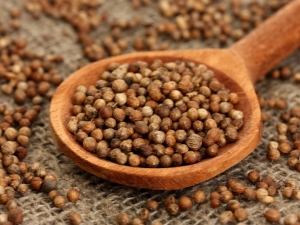
Cilantro and coriander are the same plant, only cilantro is the herb and coriander is the seed. The plant is often used not only as an ingredient in cooking, but also as a component in medical tinctures, cosmetics due to the presence of a large amount of vitamins and nutrients in it.
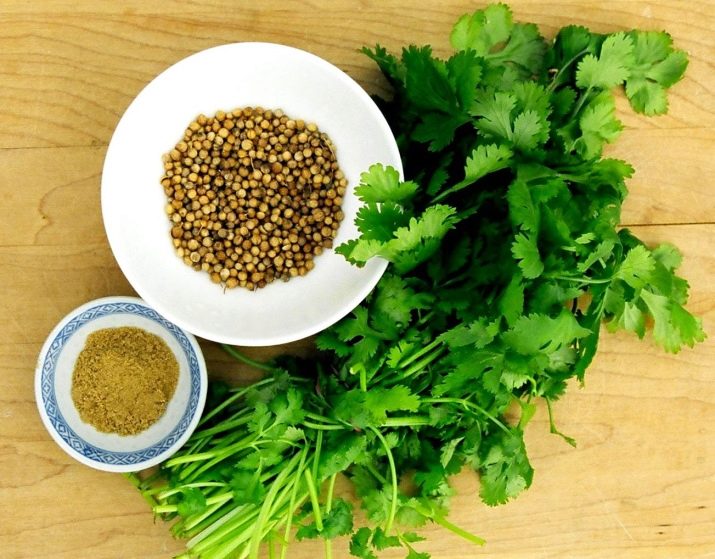
What is it and what does it look like?
The use of the plant began more than three thousand years ago. Then they believed that infusions of ground coriander give a person strength and health. Hippocrates created infusions for depression and nervous conditions, and treated skin infections. This is a seed plant from which you can get excellent honey.
It was first cultivated as a crop in the Mediterranean. Today coriander is distributed almost all over the world. Outwardly, the plant is similar in leaf shape to parsley, the length of its root reaches forty centimeters. In height, the bush can grow up to 70 centimeters. Flowers usually appear in late June, early July. As fruits, spherical seeds are used, which are called coriander. It is worth noting that the plant has a very pungent spicy smell.
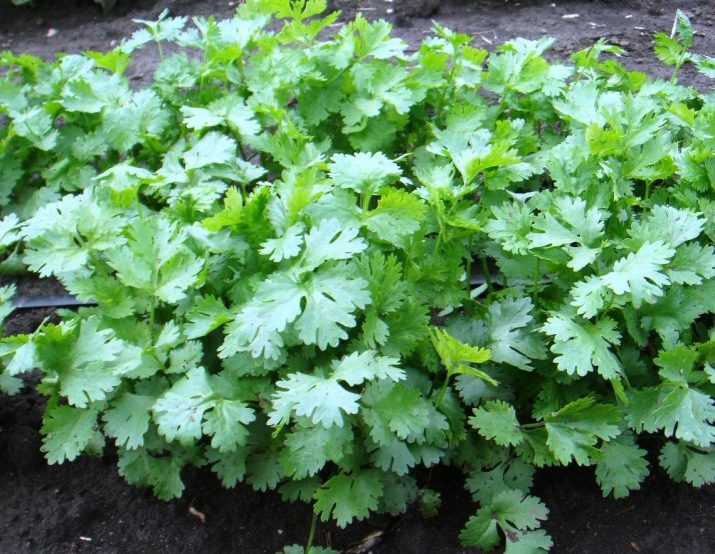
Beneficial features
Coriander is a good spice for many dishes, the leaves and seeds can be used fresh in a salad, the taste goes well with meat. The spice has many useful qualities, although some do not really like it because of the smell. However, coriander can improve appetite and digestion. The seeds are used as an ingredient to create remedies that can help treat:
- gallbladder;
- liver;
- intestines.
Few people know, but infusions from the plant have a special property - they have an expectorant and are great for coughing. They have proven effective in the treatment of colds.

After much research, scientists have found that the elements contained in coriander have a negative effect on cancer cells, so people who consume the spice in large quantities are less likely to get cancer.
The list of main components includes not only carbohydrates and proteins, but also:
- monodisaccharides;
- acids;
- vitamins of group B and not only;
- cellulose;
- minerals and alkaloids.
Undoubtedly, there are benefits from the use of this plant, people with stomatitis and toothache are advised to simply chew coriander seeds. This helps to destroy all pathogenic microorganisms, caries in the oral cavity, removes bad breath. Cooked decoctions act as a diuretic, they perfectly help and relieve inflammation in cystitis, inflammation of the gallbladder.

The tool can be successfully used for diabetes, liver problems. Excellent it helps those patients who have gastritis or ulcers, the overall action is aimed at strengthening the immune system, bones and blood vessels. It is worth drinking coriander infusions for those who have insomnia, there are constant jumps in high pressure, excessive sweating. Such a bright and not for everyone pleasant aroma is due to the high content of linalool and geraniol in the plant. Both components are widely used in the manufacture of medicines:
- choleretic;
- anti-inflammatory;
- laxatives.
Excellent infusions help with indigestion, promote better digestion of food, and can be used for various skin infections. You can often find coriander in the composition of cosmetics, since essential oils and carotene remove puffiness well, help fight acne, and whiten the face. Adding a decoction when rinsing the hair helps to strengthen them and get rid of dandruff.
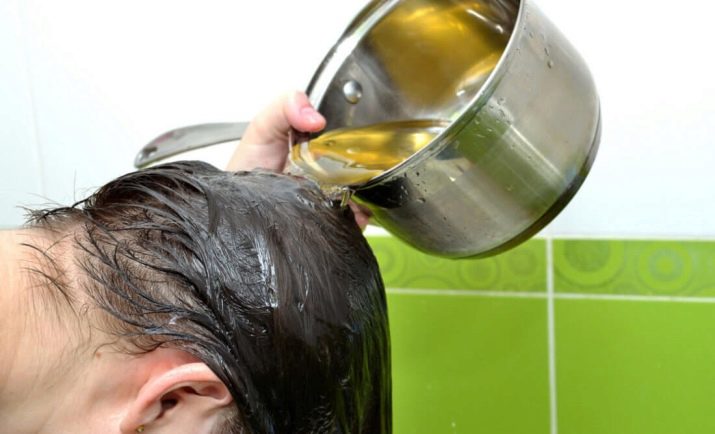
Means from coriander allow you to relieve nervous tension, improve the condition with menopause, and normalize the menstrual cycle. Most of the spices are prohibited during breastfeeding, but this rule does not apply to coriander. During pregnancy, chewing grains relieves heartburn, helps to remove nausea, and remove excess moisture from the body. The spice benefits not only women, but also the strong half of humanity, because it:
- increases potency;
- enhances libido;
- increases testosterone levels;
- is a unique aphrodisiac.
In addition, chewing the seeds can remove the smell of alcohol, cope with hemorrhoids. Spice is simply necessary for people who are trying to monitor their own weight. In addition to the unique taste of dishes, coriander improves metabolism. You can add spice to soups, soups and salads.
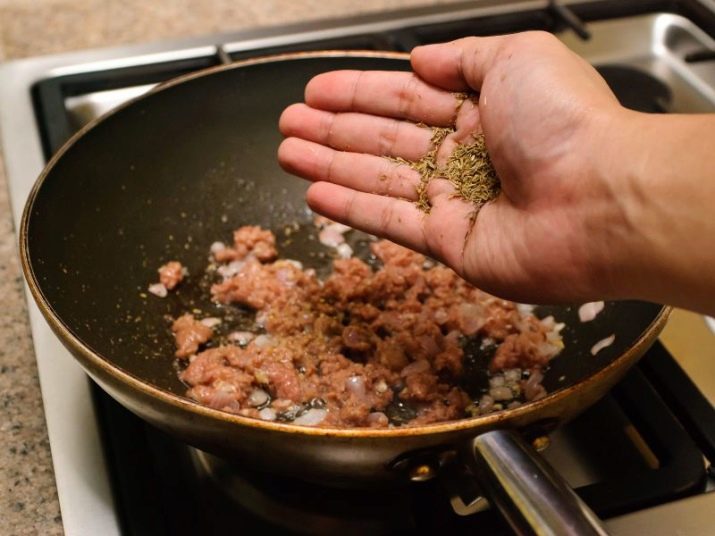
Contraindications
Despite the huge number of advantages, coriander also has contraindications, although there are few of them. Spice can be poisonous if you eat it uncontrollably. The daily norm is no more than three grams of seeds. Doctors do not recommend eating spice in large quantities for people who always have low blood pressure, have heart ischemia, and chronic cholecystitis. It is also carefully worth introducing coriander into food should be patients with thrombophlebitis.
Of course, if you put a couple of grains of a plant in a dish for flavor, then there will be no harm. Those who have an individual intolerance to the plant need to replace it.

The use of seasoning in cooking
Coriander and cilantro can be added to different dishes, this seasoning is great for meat, fish and pilaf. Eating such culinary masterpieces is a pleasure. Not only seeds are edible, but also leaves. Ground seed is actively used in baking bread (remember the taste of Borodino). The seeds of the plant are especially actively used in oriental cuisine. In India, the spice becomes the base element for many gatherings. Stewed cabbage, legumes, vegetable marinades are especially tasty. Few people know, but in some countries, cilantro seeds are turned into a dessert by candied. It is difficult to imagine the following dishes without such an ingredient:
- tkemali;
- adjika;
- satibels.
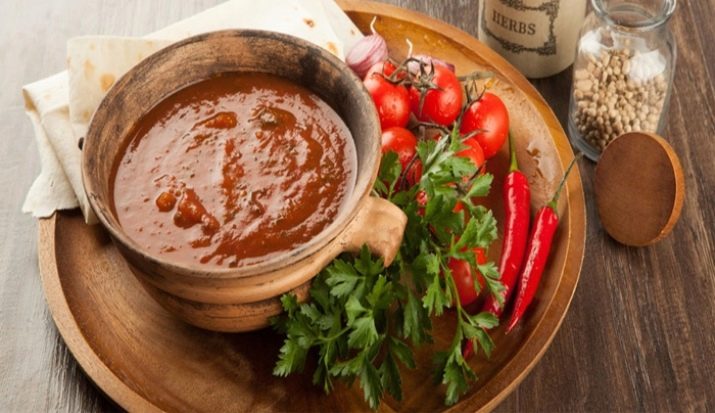
Often, ground coriander is used in baking gingerbread, cookies and other sweets. The spice goes well with beets and pumpkin in dishes. The ingredient is used in sausages, canned fish and meat. It is worth saying that even when dry, coriander does not lose its aroma, but the seeds are stored whole and ground immediately before use. Prolonged heat treatment destroys the essential oil, this is the only thing that spoils the taste of the seasoning. Of course, it can be combined with other spices.
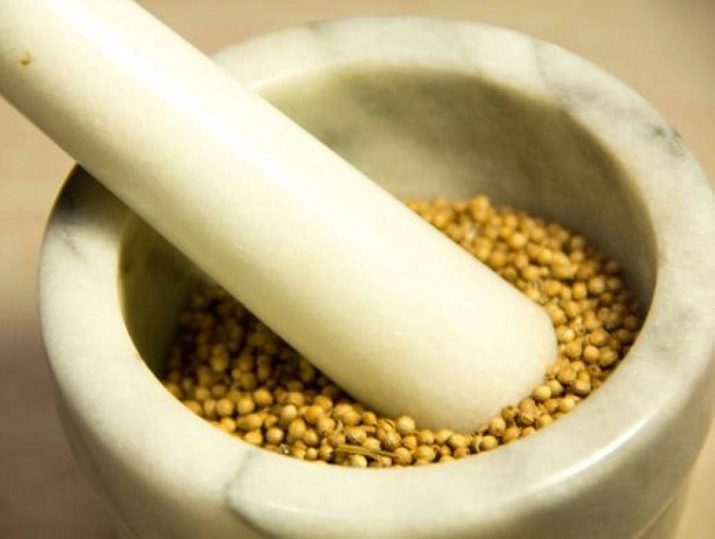
Where else is it used?
Not surprisingly, the scent of coriander has found its way into perfumery and beyond. Essential oil often acts as one of the components in cosmetics and even soap. It is ideally combined with such oils:
- citrus;
- sage;
- sandalwood;
- bergamot.
Coriander, cilantro and their infusions are used everywhere in professional cosmetology. The active elements in the composition of the plant help to gently remove age spots, improve skin condition, nourish with vitamin A. In another way, this plant is also called Chinese parsley. Regular external use helps to normalize the functioning of the sebaceous glands, the condition of the hair and scalp. The infusion perfectly restores them after dyeing, gives shine and vitality to dull and weakened hair.

Essential oil is often used in so-called aromatherapy because it activates mental activity, unleashes creativity, helps to concentrate and relieves stress. The state of deep depression can be corrected with such a home remedy. One hundred grams of seeds need a liter of red wine. The seeds must be ground before use. The composition is cleaned in a dark place for a week, every day you need to shake it.
Before use, the tincture is shaken again and drunk every day, one hundred milliliters before meals. Such a drink also has a positive effect on appetite and will return strength and energy.
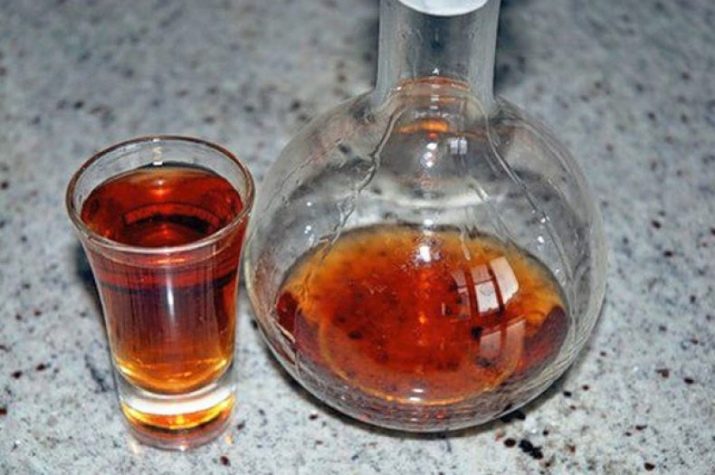
The seeds are also used in many traditional medicine recipes, while the oil is used in industry. It can be oily and ethereal. The fatty is used in the soap making process or in the production of oleic acid, while the essential oil is used in the cosmetic and pharmaceutical industries. Moreover, coriander oil helps to artificially synthesize other substances that cannot be obtained directly.
For information on how to use coriander and treat many diseases, see the following video.

















